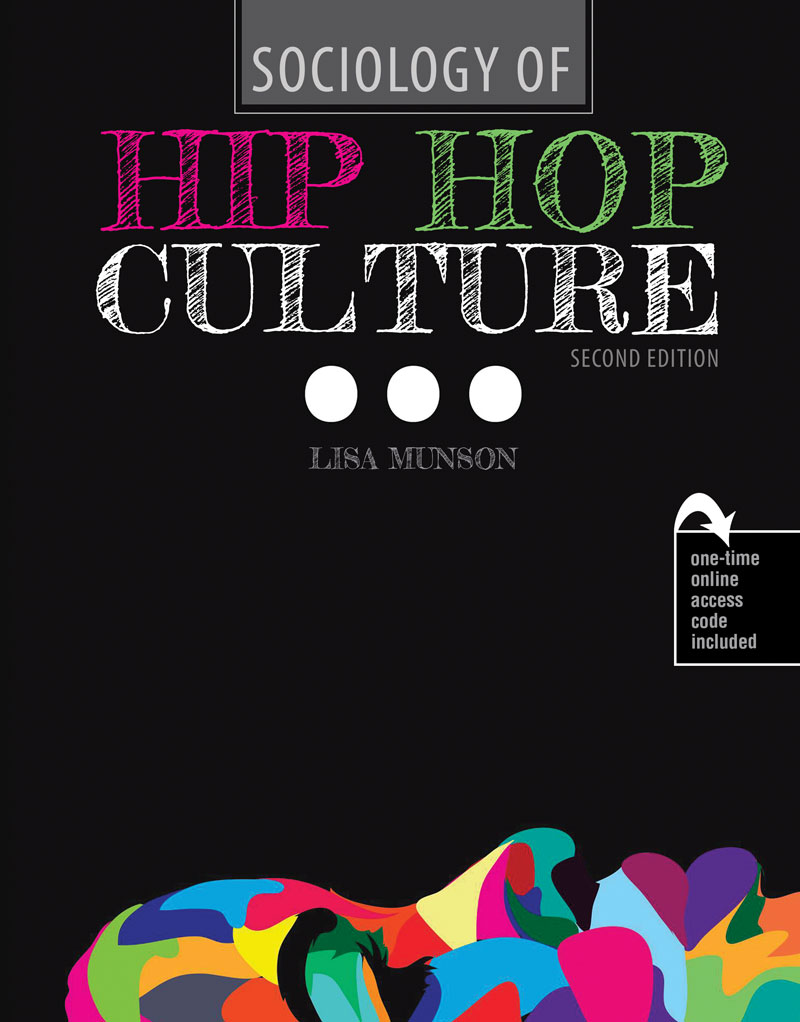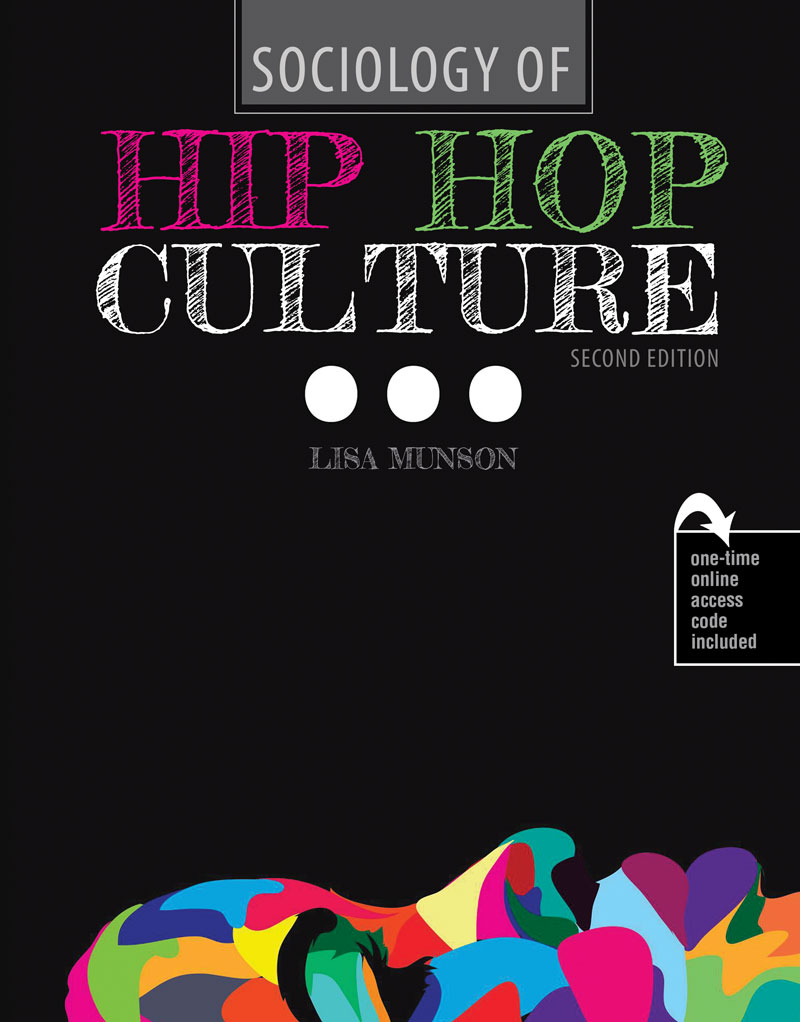Sociology of Hip Hop Culture
Author(s): Lisa Munson
Edition: 2
Copyright: 2019
The subculture of Hip Hop has received attention from the media and the academic community for both bringing awareness to issues of inequality and reinforcing stereotypes.
Sociology of Hip Hop Culture encourages students to examine messages expressed within Hip Hop culture through the application of major sociological perspectives and theories including structural functionalism, social conflict theory, symbolic interactionism and feminism. Students are challenged to think in new ways about the structural and cultural aspects of the reproduction of inequality. This turn-key course package examines the reciprocal relationship between Hip Hop culture and the broader American society. In other words, we will utilize sociological theories and methods to explore themes in Hip Hop culture and discuss the influence that Hip Hop culture has had on society.
Lisa Munson’s Sociology of Hip Hop Culture:
- Begins by defining Hip Hop culture, and looking at its history in America through a sociological lens.
- Discusses topics such as commodification and authenticity, the dynamics of race, class, gender and sexuality in Hip Hop, social and cultural capital, social stratification, social reproduction, definitions of deviance, and political and social movement messages in Hip Hop culture.
- Fuses individual reading, online assignments, group work, a research paper, and an online discussion board.
Acknowledgements
Chapter 1 Studying Hip Hop Through a Sociological Lens
Chapter 2 Commodification and Authenticity
Chapter 3 Race and Ethnicity
Chapter 4 Social Class
Chapter 5 Gender
Chapter 6 Education
Chapter 7 Deviance
Chapter 8 Politics and Social Movements
Dr. Lisa Munson is a professor at Florida State University's Sociology Department. Her research focuses on the issues of inequality and social justice, as well as innovative teaching methods, design thinking, and public sociology. With 17 years of teaching experience, Lisa has dedicated herself to curriculum development and pedagogy. She previously served on the University Faculty Senate Undergraduate Planning Committee for almost a decade, acted as Director of Undergraduate Studies for Sociology, and now supervises graduate student teaching. Lisa has authored three textbooks including one for the Sociology of Education and two for the Sociology of Hip Hop Culture, a course she created and implemented at Florida State University. She also co-edited a special edition of “Arts,” an international peer-reviewed open-access journal and is a member of the journal's Topical Advisory Board. Lisa has presented her research at conferences and universities worldwide and has organized multiple symposia, panels, and workshops that focus on education, teaching, and social change. She has received numerous teaching awards, including the recent University Innovation in Teaching award. Lisa is also recognized for her leadership and community service, with awards from outside the university. Off-campus, Lisa has organized community workshops and curated over 50 showcases of hip hop, house, and jazz music, dance, and visual art.
The subculture of Hip Hop has received attention from the media and the academic community for both bringing awareness to issues of inequality and reinforcing stereotypes.
Sociology of Hip Hop Culture encourages students to examine messages expressed within Hip Hop culture through the application of major sociological perspectives and theories including structural functionalism, social conflict theory, symbolic interactionism and feminism. Students are challenged to think in new ways about the structural and cultural aspects of the reproduction of inequality. This turn-key course package examines the reciprocal relationship between Hip Hop culture and the broader American society. In other words, we will utilize sociological theories and methods to explore themes in Hip Hop culture and discuss the influence that Hip Hop culture has had on society.
Lisa Munson’s Sociology of Hip Hop Culture:
- Begins by defining Hip Hop culture, and looking at its history in America through a sociological lens.
- Discusses topics such as commodification and authenticity, the dynamics of race, class, gender and sexuality in Hip Hop, social and cultural capital, social stratification, social reproduction, definitions of deviance, and political and social movement messages in Hip Hop culture.
- Fuses individual reading, online assignments, group work, a research paper, and an online discussion board.
Acknowledgements
Chapter 1 Studying Hip Hop Through a Sociological Lens
Chapter 2 Commodification and Authenticity
Chapter 3 Race and Ethnicity
Chapter 4 Social Class
Chapter 5 Gender
Chapter 6 Education
Chapter 7 Deviance
Chapter 8 Politics and Social Movements
Dr. Lisa Munson is a professor at Florida State University's Sociology Department. Her research focuses on the issues of inequality and social justice, as well as innovative teaching methods, design thinking, and public sociology. With 17 years of teaching experience, Lisa has dedicated herself to curriculum development and pedagogy. She previously served on the University Faculty Senate Undergraduate Planning Committee for almost a decade, acted as Director of Undergraduate Studies for Sociology, and now supervises graduate student teaching. Lisa has authored three textbooks including one for the Sociology of Education and two for the Sociology of Hip Hop Culture, a course she created and implemented at Florida State University. She also co-edited a special edition of “Arts,” an international peer-reviewed open-access journal and is a member of the journal's Topical Advisory Board. Lisa has presented her research at conferences and universities worldwide and has organized multiple symposia, panels, and workshops that focus on education, teaching, and social change. She has received numerous teaching awards, including the recent University Innovation in Teaching award. Lisa is also recognized for her leadership and community service, with awards from outside the university. Off-campus, Lisa has organized community workshops and curated over 50 showcases of hip hop, house, and jazz music, dance, and visual art.

